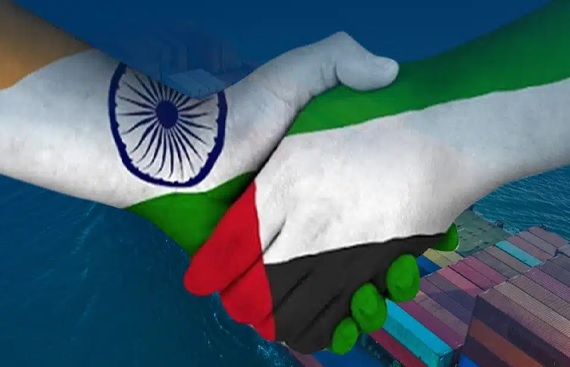Can India's Expanding Gulf Partnerships Reshape the World Economy?

India, a nation renowned for its rich cultural heritage and rapidly growing economy, has recently taken a significant step in strengthening its international relations. In a move that underscores its commitment to fostering global partnerships, India has elevated its ties with Qatar to a 'Strategic Partnership'. The State Visit of the Amir of Qatar, Sheikh Tamim bin Hamad Al Thani, to India on February 17-18, 2024, marked a significant step in strengthening bilateral economic and strategic relations. His visit coincided with the India-Qatar Joint Business Forum, where Ministers of Commerce from both countries, along with senior stakeholders in finance, energy, infrastructure, and technology, explored new avenues for collaboration. The visit followed multiple diplomatic engagements, including External Affairs Minister S. Jaishankar’s trips to Doha in June and December 2024, emphasizing the growing importance of India-Qatar ties.
This visit was particularly significant as it was Sheikh Tamim’s first to India in a decade, underscoring a renewed commitment to deepening ties. While India and Qatar do not always align on global affairs, they recognize each other’s strategic importance. Qatar views India as a globally connected power with strong diplomatic relations across West Asia, while India sees Qatar as a key Gulf player, a major source of remittances, and a critical energy partner supplying 45% of its LNG needs. With bilateral trade valued at $15 billion, the visit served as an opportunity to enhance economic cooperation and explore new areas of collaboration.
India’s Expanding Gulf Partnerships with Qatar & UAE
![]()
Prime Minister Narendra Modi extended a rare gesture by personally receiving the Qatari leader at Palam Air Force Station, setting the stage for high-level discussions. A ceremonial reception at Rashtrapati Bhavan and official talks at Hyderabad House followed, leading to the signing of key agreements aimed at deepening economic and strategic cooperation. During his visit, Sheikh Tamim also met with President Droupadi Murmu, reinforcing the diplomatic momentum between the two countries.
The India-Qatar Joint Business Forum served as a platform for forging stronger economic partnerships. With Qatar’s Minister of Commerce and Industry, Sheikh Faisal bin Thani bin Faisal Al Thani, leading the discussions, the forum focused on expanding collaboration beyond traditional sectors like energy and trade. The shift toward advanced manufacturing, electric vehicles, digital technology, and skill development emerged as key priorities. Indian expatriates, who form the backbone of Qatar’s economy, were also at the center of discussions on employment and talent exchange.
Sheikh Khalifa bin Jassim Al Thani says,” The world today is changing dramatically in terms of trade and business and the application of technology and AI. We continue investing in petrochemicals, oil, and gas in Qatar. We are focusing on growing the non-oil and gas business where we can team up with India.
Several strategic agreements were signed, including Memorandums of Understanding (MoUs) between the Confederation of Indian Industry (CII) and the Qatar Business Association, as well as between Invest India and Invest Qatar, aimed at boosting business cooperation and investment flows. Another major highlight was Qatar’s commitment to participate in Startup India Mahakumbh 2025, signaling its interest in India’s innovation and technology ecosystem.
CII President Sanjiv Puri emphasized Qatar’s growing role in India’s energy security while outlining opportunities in agriculture, skill development, and entrepreneurship. Top Qatari business figures, including Sheikh Khalifa bin Jassim Al Thani and Sheikh Hamad Bin Faisal Al Thani, echoed their enthusiasm for expanding trade and investment avenues. With bilateral trade crossing $15 billion in FY 2023-24, both sides are now looking at fresh opportunities for growth and diversification.
Sheikh Hamad Bin Faisal Al Thani , highlighted, “We are welcoming Indian business people. We are encouraging our business society, government, and public sector to invest more in India and to create more partnership in different sectors”.
UAE-India Trade: A Game-Changer in the Gulf
![]()
Meanwhile, India's economic integration with the UAE has also been a factor in determining its engagement with the Gulf. The signing of the Comprehensive Economic Partnership Agreement (CEPA) on February 18, 2022, has strengthened bilateral trade sharply, which has gone up from $43.3 billion in FY 2020-21 to $83.7 billion in FY 2023-24.Within the initial nine months of FY 2023-24, trade has reached $71.8 billion, and one of the major exports is a smartphone, worth $2.57 billion. But numbers aside, CEPA has created increased trade facilitation with the release of more than 2,40,000 certificates of origin and helping exports of $19.87 billion. Non-oil trade amounted to $57.8 billion, which represents the movement towards a diversified economic relationship encompassing processed crude oil products, jewelry and gems, electrical machinery, and chemicals.
CEPA's Joint Committee has met twice to guarantee smooth implementation, while the Trade in Goods Committee has actively resolved trade-related issues. A game-changer in this collaboration is the new Bharat Mart in Dubai, a project which Prime Minister Modi has personally endorsed to promote Indian producers on an international platform. With CEPA promoting job growth, MSME empowerment, and market access, India and the UAE are well on their way to realizing their ambitious goal of $100 billion in non-oil bilateral trade by 2030.
Expressing enthusiasm about the visit, Al Sayed said, "I'm very glad and pleased to be here in India and looking forward to enhancing the partnership even more to the next level".
Looking Ahead
As India intensifies its strategic and economic interactions with Qatar and the UAE, it is solidifying its role as a major driver of the economic landscape of the Gulf. It is not a matter of exchange numbers but one of a collaborative vision for investing, innovating, and lasting global growth. With a heavy emphasis on technology, infrastructure, and energy, India's changing relationship with the Gulf is set to unlock new opportunities, creating a dynamic economic future for the region.
